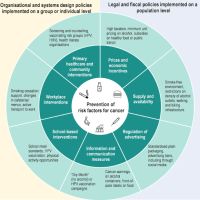A recent report released by the International Agency for Research on Cancer (IARC) ahead of World Cancer Day sheds light on the escalating burden of cancer worldwide. According to fresh projections, the number of new cancer cases in Europe is anticipated to rise by 22.5 percent over the next twenty years. Globally, there is an estimated 55 percent increase in cancer diagnoses from 2022 to 2045, soaring from approximately 19.9 million cases to 30.9 million.
Cancer cases: various factors for an increasing burden
These alarming statistics, unveiled prior to World Cancer Day on February 4th, underscore the mounting challenge posed by cancer and underscore the imperative to tackle disparities in cancer care, as stated by the IARC, a division of the World Health Organization (WHO). Factors fueling this surge include aging populations, tobacco use, alcohol consumption, obesity, and air pollution. As of today, one in five individuals will develop cancer during their lifetime, with approximately one in nine men and one in twelve women succumbing to it. As cancer incidence escalates, so does mortality, with an estimated increase from 9.7 million deaths in 2022 to 16.6 million globally in 2045. In Europe, the projected rise in cancer-related deaths stands at 32 per cent. Breast cancer ranks as the most prevalent cancer in Europe, followed by prostate and colorectal cancers, according to 2022 estimates from the IARC. Lung, colorectal, and breast cancer are the primary causes of cancer mortality in the EU.
Health financing under pressure: defeating cancer should remain priority
Dr. Hans Kluge, WHO's regional director for Europe, cautioned against undermining decades of progress in healthcare amidst mounting pressure on health financing, particularly across Europe. He emphasised the necessity for enhanced investment in healthcare post the COVID-19 pandemic. A recent report by the Union for International Cancer Control (UICC) highlighted stark inequalities in cancer care access across Europe.
Cary Adams, head of the UICC, emphasised that despite advancements in cancer detection, treatment, and care, significant disparities persist, both globally and within countries. He stressed the importance of political will in prioritising cancer care and ensuring universal access to quality services.
The UICC advocated for increased funding to address cancer disparities, integration of cancer services into national health benefits, and implementation of standardised cancer screening programmes. The latest estimates from the IARC's Global Cancer Observatory underscored substantial inequities between more developed and underdeveloped nations.
Socioeconomic differences influence cancer diagnosis and quality of care
The projected increase in new cancer cases is staggering in low HDI countries, estimated at 107 percent from 2022 to 2045, compared to 36 percent in high HDI countries. Dr. Kluge emphasised that defeating cancer requires a collaborative effort across society, integrating all aspects of the healthcare system.
The UICC pointed out that individuals with lower socioeconomic status in Sweden face a higher risk of cancer-related mortality. In Portugal, approximately 30 percent of cancer cases are attributed to tobacco consumption.
Countries with high Human Development Index (HDI) witness higher rates of breast cancer diagnosis but lower mortality rates compared to those with a low HDI. Women in low HDI countries are 50 percent less likely to be diagnosed with breast cancer but face a higher risk of mortality due to late diagnosis and inadequate treatment.
A survey conducted by the WHO revealed that a majority of countries inadequately finance cancer services as part of health coverage, necessitating substantial investment to bridge the gap between nations. The IARC cautioned that while estimates are crucial, they should be interpreted cautiously due to limitations in cancer data, particularly in low and middle-income countries.
Source & Image Credit: UICC


























